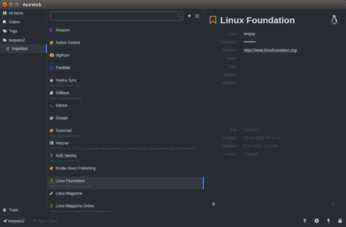KeeWeb: A Better Desktop and Web App for KeePass databases

Productivity Sauce
KeePass is one of the best password managers out there, but let's face it: the KeePass 2.x application written in Mono installs a huge number of dependencies and it looks anything but sleek on the Linux desktop. Enter KeeWeb, a lightweight desktop and web app that can handle .kdbx databases and features a polished user-friendly interface.
To run KeeWeb on a Linux desktop, grab the latest version of the app from the project's Releases page, unpack the downloaded archive, and run the KeeWeb executable binary. Open then the local .kdbx database, of link KeeWeb to Dropbox to work with databases stored on Dropbox. Instead of running KeeWeb locally, you can deploy it as a web app. To do this clone the project's GitHub repository to the document root of your server and switch to the gh-pages branch:
git clone https://github.com/antelle/keeweb.git git checkout -t origin/gh-pages
KeeWeb puts all essential tool and features at your fingertips. You can open an existing .kdbx database or create a new one from scratch. The app conveniently remembers the recently used databases, you don't need to select them manually. It's possible to organize entries into groups as well as specify tags, colors, expiration, and custom fields for each entry. KeeWeb also supports keyboard shortcuts, and there are a handful of settings you can adjust to your liking. In short, if the official KeePass application is not your cup of tea, KeeWeb offers a lightweight and sleek alternative.
comments powered by DisqusSubscribe to our Linux Newsletters
Find Linux and Open Source Jobs
Subscribe to our ADMIN Newsletters
Support Our Work
Linux Magazine content is made possible with support from readers like you. Please consider contributing when you’ve found an article to be beneficial.

News
-
Keep Android Open
Google has announced that, soon, anyone looking to develop Android apps will have to first register centrally with Google.
-
Kernel 7.0 Now in Testing
Linus Torvalds has announced the first Release Candidate (RC) for the 7.x kernel is available for those who want to test it.
-
Introducing matrixOS, an Immutable Gentoo-Based Linux Distro
It was only a matter of time before a developer decided one of the most challenging Linux distributions needed to be immutable.
-
Chaos Comes to KDE in KaOS
KaOS devs are making a major change to the distribution, and it all comes down to one system.
-
New Linux Botnet Discovered
The SSHStalker botnet uses IRC C2 to control systems via legacy Linux kernel exploits.
-
The Next Linux Kernel Turns 7.0
Linus Torvalds has announced that after Linux kernel 6.19, we'll finally reach the 7.0 iteration stage.
-
Linux From Scratch Drops SysVinit Support
LFS will no longer support SysVinit.
-
LibreOffice 26.2 Now Available
With new features, improvements, and bug fixes, LibreOffice 26.2 delivers a modern, polished office suite without compromise.
-
Linux Kernel Project Releases Project Continuity Document
What happens to Linux when there's no Linus? It's a question many of us have asked over the years, and it seems it's also on the minds of the Linux kernel project.
-
Mecha Systems Introduces Linux Handheld
Mecha Systems has revealed its Mecha Comet, a new handheld computer powered by – you guessed it – Linux.

